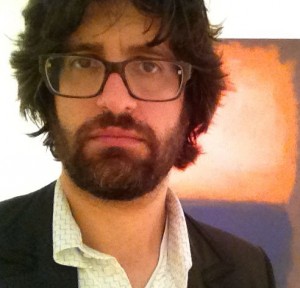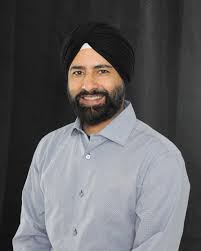 John L. Modern is an Associate Professor of Religious Studies at Franklin & Marshall College, researching American religions, technology, and aesthetics. Modern is the author of The Bop Apocalypse: The Religious Visions of Kerouac, Ginsberg, and Burroughs (University of Illinois Press, 2001) and Secularism in Antebellum America (University of Chicago Press, 2011). He is currently at work on two projects: The Religion Machine: A Particular History of Cognitive Science and Akron Devo Divine (working title), which explores the 200 year history of rubber and religious mission that undergirded the Akron punk scene in the 1970s.
John L. Modern is an Associate Professor of Religious Studies at Franklin & Marshall College, researching American religions, technology, and aesthetics. Modern is the author of The Bop Apocalypse: The Religious Visions of Kerouac, Ginsberg, and Burroughs (University of Illinois Press, 2001) and Secularism in Antebellum America (University of Chicago Press, 2011). He is currently at work on two projects: The Religion Machine: A Particular History of Cognitive Science and Akron Devo Divine (working title), which explores the 200 year history of rubber and religious mission that undergirded the Akron punk scene in the 1970s.
Keynote Talk: “The Smell of Rubber Burning”
This lecture will revisit the end of the world as it occurred in Akron, OH in the 1970s. Tire production in Akron declined precipitously between 1967 and 1979 and by 1983 had lost all of its tire and truck tire operations. As technological systems of assessment expanded and coiled, individual workers became expendable. Massive numbers of labor hours were trimmed as new automated technics were introduced in factories outside of Akron. The twenty thousand rubber workers who lost their jobs may have looked for comfort in The People Side of Systems, a guidebook published in 1976 instructing managers about how to ease concerns of workers made anxious by the incursion of computer systems into the workplace. “The secrecy of operations and centralization of administrative authority that characterize large corporations” was something to be embraced and not feared. For this was the age when self-conscious systems began to care deeply, as they never had before, about each individual. Through a series of interconnected stories I will address experiences of magic, dread, and systematicity as they occurred during this Akron apocalypse.
 Arvind-Pal Mandair is the Associate Professor and S.C.S.B Endowed Professor of Sikh Studies at the University of Michigan. He is the author of Religion and the Specter of the West: Sikhism, India, Postcoloniality, and the Politics of Translation (Columbia University Press, 2009); Sikhism: A Guide for the Perplexed (Continuum-Bloomsbury Press, 2013); and co-editor of Secularism and Religion-Making (Oxford University Press, 2011). He is working on three projects: Untimely Logics, Thinking Between Cultures, and Mourning Sovereignties.
Arvind-Pal Mandair is the Associate Professor and S.C.S.B Endowed Professor of Sikh Studies at the University of Michigan. He is the author of Religion and the Specter of the West: Sikhism, India, Postcoloniality, and the Politics of Translation (Columbia University Press, 2009); Sikhism: A Guide for the Perplexed (Continuum-Bloomsbury Press, 2013); and co-editor of Secularism and Religion-Making (Oxford University Press, 2011). He is working on three projects: Untimely Logics, Thinking Between Cultures, and Mourning Sovereignties.
 Wonhee Anne Joh is the Associate Professor of Systematic Theology at Garrett-Evangelical Theological Seminary. Her research draws on feminist theory, theology, postcolonialism, and affect. Her first book is Heart of the Cross: A Postcolonial Christology (Louisville: Westminster John Knox Press, 2006). She is currently at work on a new book project entitled Terror, Trauma and Loss: A Postcolonial Theology of Hope along with two collections she is editing with Nami Kim: Engaging the United States as a Military Empire: Critical Studies of Christianity from Asian/Asian North American Perspectives and Korean Christian LGBT: A Critical Approach.
Wonhee Anne Joh is the Associate Professor of Systematic Theology at Garrett-Evangelical Theological Seminary. Her research draws on feminist theory, theology, postcolonialism, and affect. Her first book is Heart of the Cross: A Postcolonial Christology (Louisville: Westminster John Knox Press, 2006). She is currently at work on a new book project entitled Terror, Trauma and Loss: A Postcolonial Theology of Hope along with two collections she is editing with Nami Kim: Engaging the United States as a Military Empire: Critical Studies of Christianity from Asian/Asian North American Perspectives and Korean Christian LGBT: A Critical Approach.
Keynote Talk: “Militarized Terror and Loss: Transnational Counter-Affective Politics of Resistance”
Korea is the only nation in the world technically at cease-fire for over 70 years since the Korean War began. The cease-fire is indefinite while arms built-up continue to escalate and war simulations continue with regularity along the Demilitarized Zone that is the most heavily militarized border in the world today. Prolonged living within the traumas of this unending war has become ‘crisis ordinary’ for many Koreans who live directly with war for over 70 years. Practices of mourning must happen collectively and intentionally so that possibilities for forging affective solidarities across time and space might occur not only among Koreans but also with other collectivities that live in the ruins of militarized traumas. With ‘the logic of relation’ implicit here I focus on one specific case: the DMZ of Korea and the historical traumas caused by the U.S/Mexico border. Although seemingly disparate, and no equivalence is possible, these historical traumas resonate with experiences of dispossession and unending sense of loss, unmourned grief and pooling of collective melancholia rooted in historical and material conditions of militarism, conquest, colonialism and neoliberalism. In northern New Mexico peoples whose lives are considered disposable in the securitization of lives that are considered worth saving experience a form of slow violence that is a continuation of colonial dispossession and destruction especially at the Los Alamos National Laboratory which is committed to weapons (nuclear) research. This continued violence and dispossession of natives and the surrounding land of northern New Mexico are implicitly connected to U.S. militarized imperialism globally and especially in Korea. By examining the legacy of terror, loss and unmourned grief at both places I suggest that the political works of critical melancholia and mourning entails affective solidarities across archives so as to unsettle temporal frameworks that are usually deemed discreet and without relations. Perhaps it is through such transnational affective solidarities that new forms of counter-affective configurations (perhaps mourning as love) might form transpacific, transatlantic, transborder movements to resist terrors of global militarism.
